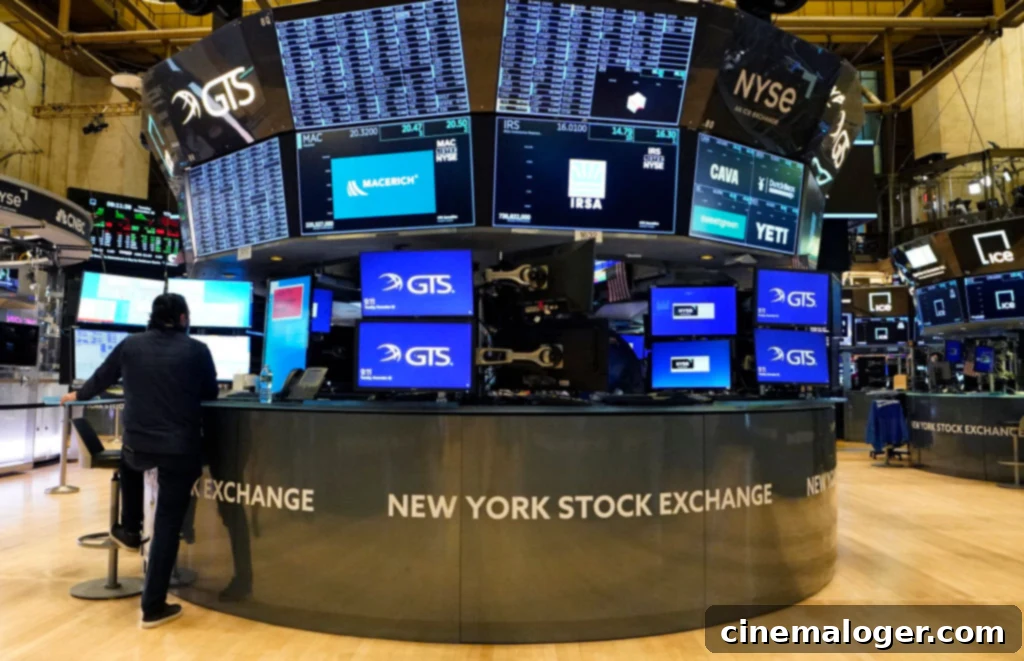Black Friday Stock Market Hours: Your Essential Guide to Holiday Trading Schedules
As the holiday season officially begins, marked by the Thanksgiving federal holiday when the stock market observes a full shutdown, attention quickly shifts to the Black Friday trading schedule. This period is notorious for its retail frenzy, but what does it mean for investors? Is it business as usual, or do the financial markets adjust their hours for this unofficial holiday shopping kickoff? Understanding the operating hours of major exchanges like NASDAQ and the New York Stock Exchange (NYSE) during such times is crucial for making informed investment decisions and managing your portfolio effectively.
Black Friday, widely recognized for its aggressive retail discounts and massive consumer spending, unofficially launches the Christmas shopping season. Prominent retailers such as Walmart, Target, Kohl’s, and countless other department stores roll out their most enticing deals, attracting millions of shoppers both in brick-and-mortar stores and online. While Black Friday is not officially recognized as a federal holiday, its immense cultural and economic impact often leads to altered business operations across various sectors, including the sensitive world of financial markets. Typically, the NYSE and NASDAQ maintain regular trading hours from 9:30 a.m. to 4:00 p.m. Eastern Time (ET) on weekdays, but holiday periods, even unofficial ones, can introduce significant variations. This guide will clarify the specific details for Black Friday and other key holiday dates, ensuring investors are always abreast of when the market bell rings and when it signals an early close.

Black Friday Stock Market Opening Hours
For investors keen on understanding the market’s schedule on Black Friday, there’s a degree of consistency to be aware of regarding opening hours. Both NASDAQ and the NYSE adhere to their standard opening time, with trading commencing promptly at 9:30 a.m. ET. This ensures that market participants can react to any overnight global market movements, economic news releases, or pre-market trading activity right from the very start of the day. Despite the preceding Thanksgiving holiday and the consumer focus on retail sales, the financial markets maintain their regular early morning schedule, allowing for continuous price discovery and transaction execution.
When Does the Stock Market Close on Black Friday?
While the opening hours remain consistent, Black Friday is distinct for its notably shortened trading session. The U.S. stock markets, encompassing both the NYSE and NASDAQ, typically close earlier than usual on Black Friday. According to reliable financial news sources such as USA Today, the stock market concludes its trading day at 1:00 p.m. ET. This means investors have a significantly reduced window for placing orders and executing trades, making the early hours of the session particularly active and crucial. Furthermore, the bond market in the U.S. also observes an early closure, generally shutting down at 2:00 p.m. ET on Black Friday. This abbreviated schedule is a long-standing tradition following federal holidays, reflecting expected lower trading volumes and providing market participants an extended holiday weekend. This allows them to either spend more time with their families or participate in the extensive Black Friday shopping events.
The shortened trading day can influence market dynamics in several ways. Trading volumes are often lighter, as many institutional traders and individual investors extend their holiday break. This reduced liquidity can sometimes lead to heightened volatility in specific stocks or sectors, particularly those sensitive to consumer spending and retail performance. Investors closely monitor any early reports on holiday sales, as these can quickly sway sentiment. Understanding this unique trading environment is vital for active traders to adjust their strategies and for long-term investors to be aware of potential market shifts.
Analyzing Black Friday Market Performance
Historically, Black Friday trading sessions, despite their brevity, often offer intriguing insights into broader market sentiment and the health of the economy. For instance, on Friday, November 29 (of a recent year), financial data reported by outlets like Yahoo! Finance indicated positive market movement. The Dow Jones Industrial Average experienced an increase of 0.3 percent, and the S&P 500 saw a rise of 0.2 percent. Such positive movements on Black Friday can be attributed to various factors, including optimistic early consumer spending reports, robust economic indicators, or simply a continuation of positive pre-holiday market momentum. Investors frequently scrutinize the retail sector stocks on Black Friday, as strong sales figures are often interpreted as a positive sign for consumer confidence and overall economic health, which generally correlates with a buoyant market. Conversely, any indications of weaker-than-expected sales could potentially dampen investor confidence and exert downward pressure on retail-related stocks and the broader market.
When Do Black Friday Retail Deals Conclude?
While the financial markets operate on a fixed and precise schedule, the world of Black Friday retail deals is considerably more dynamic and varied. The duration of Black Friday sales largely depends on individual retailers, their specific promotional strategies, and product availability. Many “doorbuster” deals are limited to the early hours of Black Friday itself or conclude when stores close for the day. However, a significant number of promotions often extend throughout the entire weekend, seamlessly transitioning into Cyber Monday deals. Some sales are quantity-limited, ending once stock runs out, regardless of the official end date. Larger retail chains, like Walmart, are known for extending their special offers over several days, sometimes from late November through early December. For example, Walmart typically offers special deals for almost a week, ensuring shoppers have multiple opportunities to take advantage of discounts beyond just Black Friday itself. This extended promotional period highlights the intensely competitive nature of holiday retail and offers consumers greater flexibility, a stark contrast to the rigid, albeit altered, schedule of the financial markets.
Is the Stock Market Open on Cyber Monday?
Following the Black Friday weekend, Cyber Monday emerges as another major shopping event, particularly focused on online deals and e-commerce. Unlike Black Friday, which often sees an adjusted market schedule, Cyber Monday typically proceeds as a regular trading day. The entire U.S. stock market, including both the NYSE and NASDAQ, is generally scheduled to operate during its standard hours on Cyber Monday. This means investors can expect markets to open at 9:30 a.m. ET and close at 4:00 p.m. ET, providing a full trading session. This allows investors ample time to react to the weekend’s comprehensive retail sales data, process economic news, and position their portfolios for the final stretch of the trading year. The shift from a physical store shopping frenzy to an online shopping bonanza usually does not impact the financial market’s operational hours, thereby maintaining a sense of normalcy in the trading week.
Stock Market Hours Around Christmas and New Year’s
The year-end holiday season brings further significant adjustments to the stock market’s calendar. Christmas Day, December 25, is observed as a federal holiday, meaning the entire U.S. stock market is closed. This provides a full day of cessation for all market activities. Additionally, similar to Black Friday, Christmas Eve (December 24) often features an early market closure. While exact closing times can vary slightly depending on how the holiday falls and specific exchange announcements, it is a common practice for markets to shut down early on Christmas Eve, frequently around 1:00 p.m. ET, mirroring the Black Friday schedule. Investors must verify specific closing times closer to the date through official exchange announcements or reliable financial news sources. These shortened trading days are particularly important for year-end portfolio rebalancing, tax-loss harvesting strategies, and any final transactions before the new year. Similarly, New Year’s Day (January 1) is a federal holiday resulting in a full market closure, and New Year’s Eve can also sometimes feature early closures, though less consistently than Christmas Eve.
Important Federal Holidays Affecting Stock Market Hours
Beyond the Thanksgiving and Christmas periods, investors must remain aware of the comprehensive list of federal holidays during which U.S. stock markets are typically closed. These closures are strategically aligned with national observances to ensure consistency and fairness for all market participants. Key federal holidays leading to full market closures include:
- New Year’s Day (January 1)
- Martin Luther King, Jr. Day (Third Monday in January)
- Washington’s Birthday / Presidents’ Day (Third Monday in February)
- Good Friday (Varies annually, typically March or April)
- Memorial Day (Last Monday in May)
- Juneteenth National Independence Day (June 19)
- Independence Day (July 4)
- Labor Day (First Monday in September)
- Thanksgiving Day (Fourth Thursday in November)
- Christmas Day (December 25)
On days immediately preceding or following some of these federal holidays, especially if they fall midweek, markets might also have shortened trading hours. It is always prudent for investors to consult the official NYSE and NASDAQ holiday schedules well in advance to anticipate any potential disruptions to their trading activities and portfolio management.
Planning Your Investments Around Holiday Trading Schedules
Awareness of these detailed holiday trading schedules extends beyond merely knowing when you can place an order; it forms a critical component of strategic financial planning. Shortened trading days or full market closures can significantly impact market liquidity, overall trading volumes, and potentially increase price volatility. For active traders, these periods often necessitate adjustments to their strategies, such as reducing position sizes, avoiding highly volatile assets, or refining entry and exit points. Long-term investors, while generally less affected by day-to-day fluctuations, should still be mindful of market closures, especially if they anticipate needing access to funds, plan to execute significant transactions, or wish to make year-end portfolio adjustments. It is advisable to plan any major transactions or transfers with ample lead time before market holidays. Furthermore, crucial economic data releases or corporate earnings announcements scheduled around these holidays can have an amplified impact due to reduced trading windows or the heightened anticipation built up during a market closure, leading to sharp movements when markets reopen.
Conclusion: Stay Informed for Smart Trading
In summary, while Black Friday is widely celebrated for its retail deals, it is equally important for investors to remember that it introduces a modified stock market schedule. The NYSE and NASDAQ maintain their standard 9:30 a.m. ET opening but notably close early at 1:00 p.m. ET, with the bond market following suit at 2:00 p.m. ET. Conversely, Cyber Monday typically observes regular trading hours, providing a full session. As the year draws to a close, remember that Christmas Day results in a full market closure, and Christmas Eve usually entails an early finish. Being proactively informed about these holiday trading hours is a fundamental aspect of effective financial planning, risk management, and smart investing. Always refer to official exchange calendars to confirm exact schedules, ensuring you can navigate the dynamic and sometimes unpredictable world of financial markets successfully, even amidst the festive distractions.
